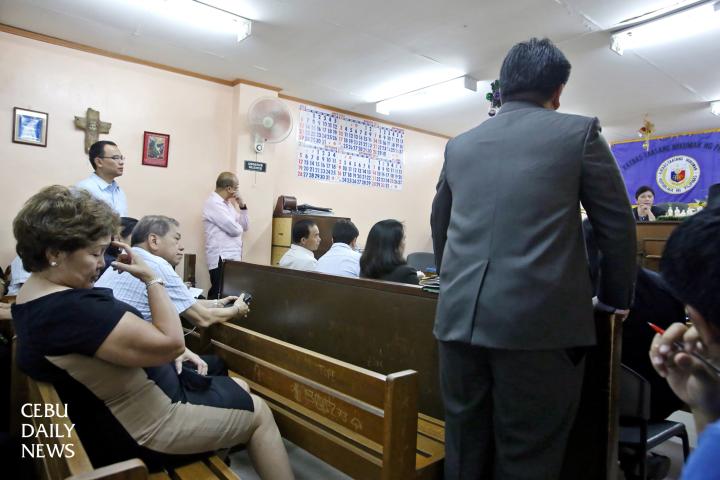BANK FRAUD TRIAL STARTING

Lapu Lapu City Mayor Paz Radaza (seated, left), listens as her Manila-based lawyer Hansen Dy (standing, back to camera) addresses Judge Teresita Galanida of the Regional Trial Court of Mandaue City.
(CDN PHOTO/JUNJIE MENDOZA)
Charges of bank fraud in a case linked to the closure of the Subangdaku Rural Bank of Mandaue city five years ago will be heard in a trial court in Cebu.
Yesterday was the scheduled arraignment of Lapu-Lapu City Mayor Paz Radaza and several others accused by the Bank Sentral ng Pilipinas of creating fictitious bank loans amounting to P2.6 billion.
It was supposed to be their chance to have the charge formally read out to them and to enter their plea.
However, the judge reset the arraignment to Sept. 24, 2015 next year, with a plea for defense lawyers to stop flooding the court with lengthy pleadings before the trial could get started.
“It’s not easy to handle many cases with lengthy pleadings. The filing of pleadings should stop otherwise this courtroom will not be enough to situate your paperwork,” said Judge Teresita Galanida of the Regional Trial Court (RTC) in Mandaue.
The judge earlier denied a pleading of Mayor Radaza’s lawyer who questioned whether there was probable cause for the criminal charges, and sought a judicial determination.
She gave all parties time to submit whatever motions they want the court to resolved and rescheduled the arraignment to next year.
Radaza’s Manila-based lawyer Hansen Dy said they would file a motion for reconsideration to contest the court’s denial of their pleading.
Mayor Radaza was a barangay captain in Lapu-Lapu city and her husband Arturo was city mayor when she served as president of the Subangdaku Rural Bank and a member of the bank’s credit committee.
In Jan. 8, 2009, the Cebu-based bank was closed and placed in receivership by the Banko Sentral ng Pilipinas, alarming thousands of depositors who suddenly couldn’t withdraw from their frozen accounts.
Yesterday Mayor Radaza appeared calm in the court room and smiled at times as her lawyer addressed the judge. The mayor declined to issue any statement.
When the criminal charges were filed against her last January by the PDIC with the Department of Justice, Radaza said at the time that she would not let this “personal” trial affect her work as city mayor.
Although the bank closure was harped on by political critics as an example of corruption, it didn’t stop Radaza’s election as Lapu-Lapu city mayor in 2010 and reelection in 2013, or that of her husband as congressman, and later her daughter, Aileen, the current representative of the lone district of Lapu-Lapu city.
Also charged in court with Radaza were Francisco Gaisano, Peter Gaisano, Gloria Gaisano, Sonia Go, Divina Llamoso, Julius Eullaran, Marmelina Cuevas, Glenn Patrimonio, Aileen del Fierro, Rhuel Ayong, and Jufriel Argawanon.
They are facing trial for violation of section 36 of the General Banking Law of 2000 (Republic Act 8791) in relation to Section 36 of the New Central Bank Act (Republic Act No. 7653).
The penalty for violation of banking laws is a fine of P50,000 to P200,000 or imprisonment of two to ten years, or both as decided by the court.
Section 36 refers to restrictions on bank exposure of directors, officers and stockholders.
No director or bank officer shall borrow from the bank, either directly or indirectly, for himself or as the agent of others. Neither can they become a guarantor, indorser or surety for loans from the bank to others except with the written approval of the majority of all bank directors.
Lawyer Bonifacio Alentajan, counsel of the Gaisanos, is also seeking the dismissal of the string of charges filed in court.
The judge yesterday ordered the dismissal of the case against Francisco Gaisano who died last October 2013.
The judge issued an arrest warrant against respondents Vicente Laurito, Patrick Heton, and Maribel Duran who have not submitted themselves to the jurisdiction of the court.
The rest have posted bail for their temporary liberty during the court case.
The Philippine Deposit Insurance Corporation (PDIC) earlier filed criminal charges against Radaza as former bank president, and Julius Eulllaran, the bank’s former loans manager “for the creation of fictitious loans and conducting business in an unsafe and unsound manner.”
In its complaint, PDIC said the accused “conspired and caused the creation of 6,051 fictitious bank loans” from 2004 to 2008.
These accounts accounted for 97 percent of all loans released by the rural bank head office during the four-year-period.
According to the PDIC, the officials orchestrated the creation of official receipts and made it appear that payments were being made to the bank, when none was being received. These supposed payments were used to cover for fictitious loan proceeds.
In January 2009, the bank suddenly closed its doors and declared a “bank holiday.”
Depositors were alarmed when the were were unable to withdraw their accounts in Mandaue City and six other branches in Lapu-Lapu City, Talisay City, General Santos in Sojuth Cotabato, Las Pinas in Manila, Digos in Davao, and Dumaguete City.
Nobody could explain at that time why the Cebu-based rural bank was declared “insolvent” and taken over by the PDIC.
Four years after, PDIC filed criminal cases against the accused for creating fictitious bank loans.
“This is the can of worms we have been waiting to be opened,” said Radaza’s nemesis businessman Efrain Pelaez Jr., at the time. “If she can make a bank go bankrupt, why not the City of Lapu-Lapu?”
Pelaez earlier ran for Lapu-Lapu city mayor under the Liberal Party but lost to her in two elections.
Since then, Mayor Radaza has been rebranding Lapu-Lapu City as a “historic resort city” that is ideal for investments and tourism, and taking extra effort to show that her administration is leaving a legacy of “good governance” and a positive business investment climate.